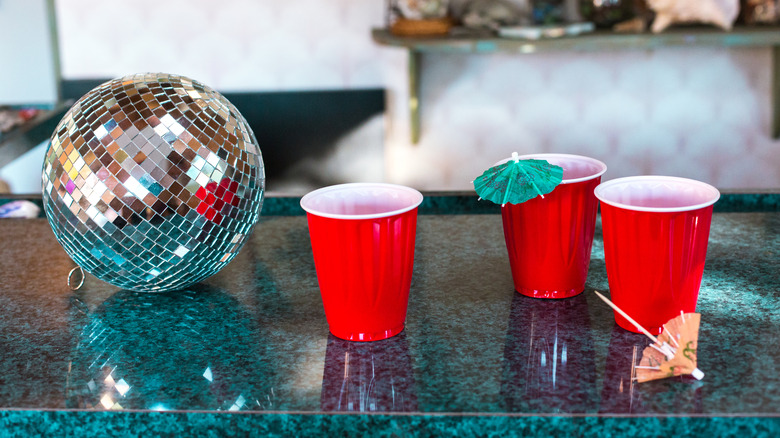Here's How The World's Oldest Drinking Game Was Played
Everyone knows the rules of beer pong, even if they become hotly debated after a few rounds. But what about the rule book for kottabos? Kottabos is the oldest drinking game we know of, dating back to the 4th century B.C. in Sicily, Greece. Players would sit around a target, flinging (or attempting to fling) wine sediment to knock down a plate precariously balanced on a pole or, less commonly, to sink floating discs. Those who were a dab hand at the strategy earned serious societal kudos — enough motivation to take the game seriously and not just relish coating opponents in wine residue. To abide by the rules, players were reclined on couches spread at equal distances to the target. They would — or should — have taken turns to clearly differentiate who threw the winning shots. Of course, who knows if they were sticklers for the rule book. Kottabos was enjoyed in all parts of Greek society, but especially at symposia: parties held by men in private homes.
Maybe you could re-enact it at your next dinner party? It's not that dissimilar from the Super Bowl drinking game you can play right from the couch (and a bit cheerier than "The Notebook" drinking game for Valentine's Day).
What were Ancient Greek parties like?
When all we see are immaculate statues and impressive ruins, it's easy to forget that the Ancient Greeks actually knew how to throw a party. Far from stuffy and stiff-upper-lipped, celebrations were an integral aspect of Greek culture. There was a packed calendar of god- and goddess-related festivities, and that's without factoring in personal events like birthdays. Ancient Greek parties would have ranged from public affairs to intimate functions like symposia.
It was common for symposia to involve hetairai, women mostly hired for musical entertainment, and a feast. Food was basic; olives and cheese were commonplace, yet salted fish or seafood was more luxurious. There were early variations of meals like souvlaki, though, which is incidentally one of the Greek dishes you need to try at least once. In the rowdiest of gatherings, the food would give way to a number of toasts to the gods and a subsequent drinking party. Guests would share philosophical thoughts and interpretations, often donning garlands. And, eventually, this could give way to games like kottabos. It doesn't sound too different from modern after-parties, does it?

